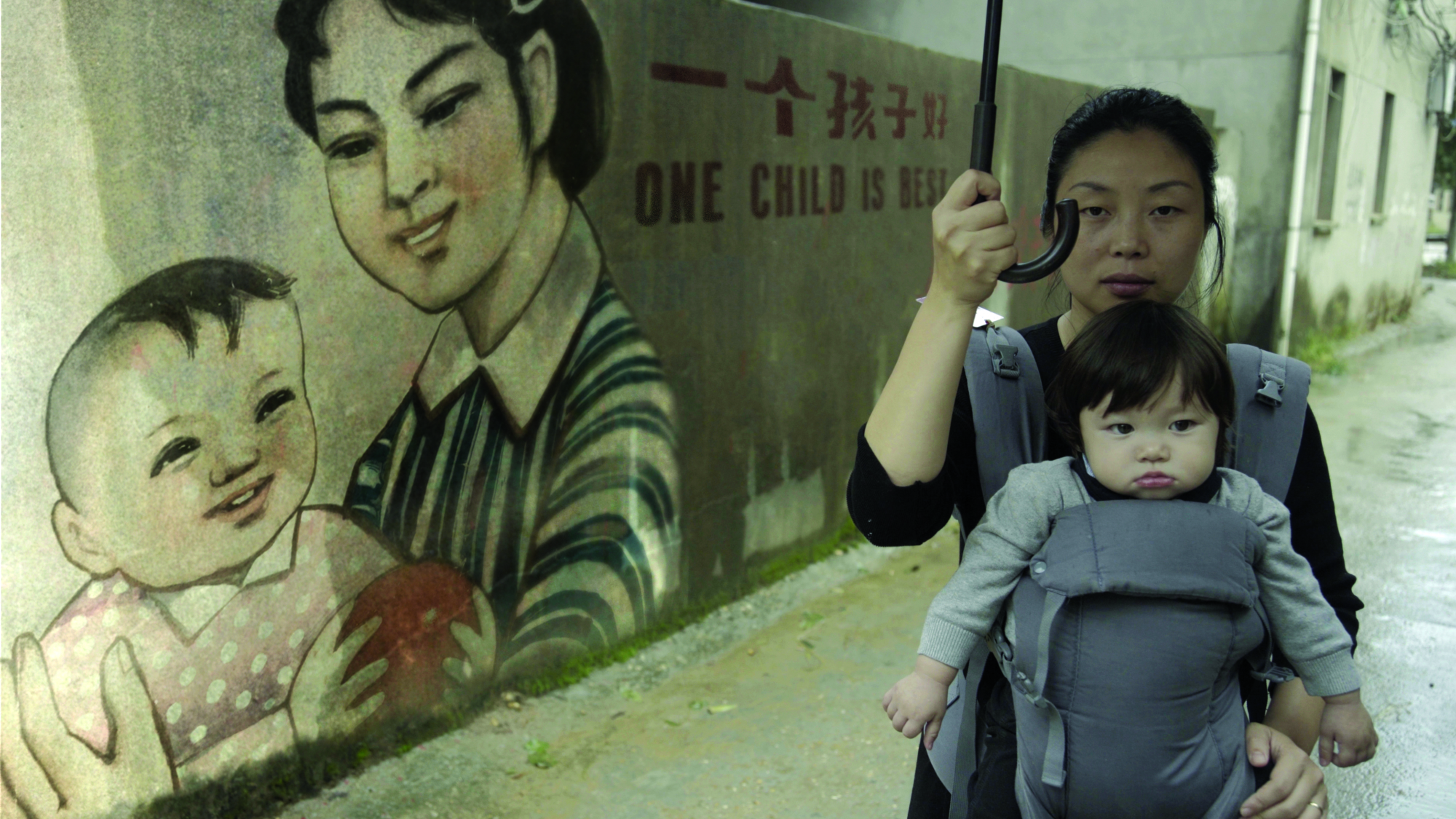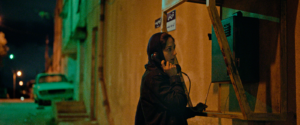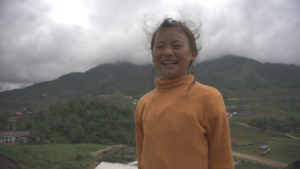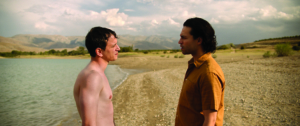The personal often sits at the centre of the political. In One Child Nation (Nanfu Wang & Jialing Zhang, 2019), the Sundance US Grand Jury Prize–winning documentary that takes a skewering look at China’s state-introduced one-child policy, this sentiment is manifested in palpably clear-eyed fashion. The film presents a deep-dive investigation of this 36-year-long scheme, cracking open the corrupt networks and top-down ideology that enabled its longevity and its impact on the citizens traumatised during its implementation.
The scale of the nationwide policy was enormous, setting a mandatory limit on the number of children born from 1979 to the end of 2015 – ostensibly having prevented 400 million births.[1]This is a widely cited figure in China, but it is contested; see Martin King Whyte, Wang Feng & Yong Cai, ‘Challenging Myths About China’s One-child Policy’, The China Journal, no. 74, 2015, pp. 155–8. But One Child Nation doesn’t succumb to simplistic, broad-strokes storytelling, instead opting for a more immediate and intimate approach. Initially flicking back and forth between newsreel propaganda footage and present-day interviews, the film eventually settles on capturing events from Wang’s perspective; her own curiosity and reflections about her upbringing become the documentary’s starting point for excavating the past. In an American hospital, Wang holds her firstborn baby boy in her arms, conversing with her mother in Mandarin about the complicated mechanics of the policy: how it was legitimised at the time, and whether, by today’s standards, it could be justified as a means of population control.[2]See Tessa Berenson, ‘Here’s How China’s One-child Policy Started in the First Place’, Time, 29 October 2015, <https://time.com/4092689/china-one-child-policy-history/>, accessed 24 October 2019. Their discussion reopens wounds and draws out burning questions that she didn’t know still lived in her consciousness: ‘Becoming a mum felt like I was giving birth to my memories,’ Wang narrates in voiceover.
Wang was born in 1985, during the early days of the policy, and the documentary follows her as she returns to her rural village in China’s Jiangxi province. She remembers a particularly ubiquitous image from her childhood – two beaming parents holding their one child – that was widely printed on seemingly innocuous items: playing cards, calendars, matches, snack boxes. It’s through Wang’s direct connection to the village that she is able to interview members of the community: older female relatives, once subjected to sterilisation, and the former village chief who administered the procedures. The descriptions of women being stripped of their bodily autonomy are wincingly detailed, as if the present hasn’t yet healed the scars of the past. The local midwife who delivered Wang as a baby expresses the most visible guilt; she performed a staggering 50,000–60,000 sterilisations and abortions while the policy was in effect. In a moving, near-cathartic scene, she welcomes Wang into a room in her office, where she displays walls of colourful flags and photos of babies – gifts of thanks from couples she now treats as an infertility specialist (a conscious career move on her part). The camera then pans across the room to reveal a shrine-like cavern of atonement: every inch of its walls is covered with these tangible reminders of the lives she has brought into the world as repentance for the ones she feels she had taken away.
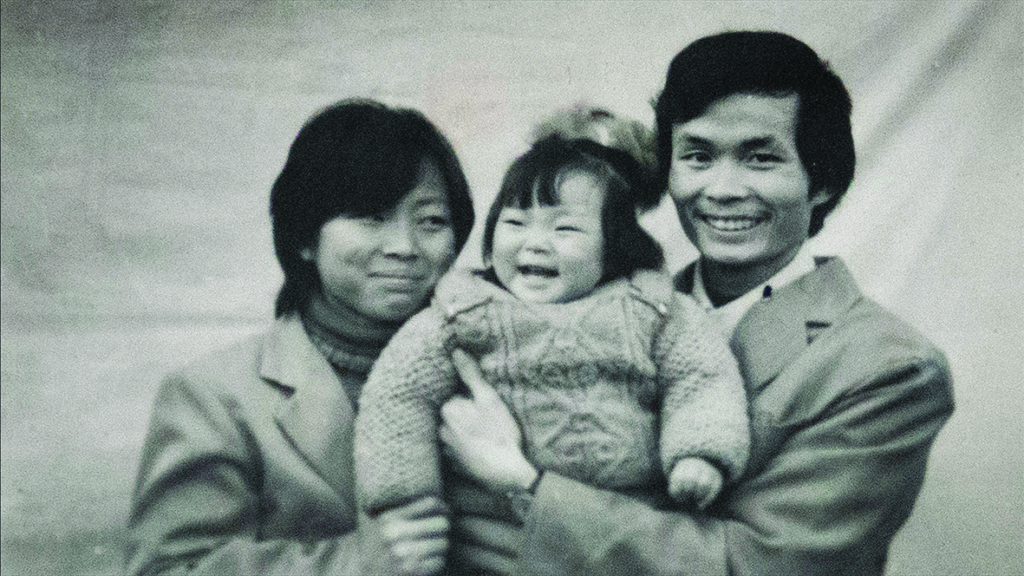
Slowly but surely, the answers offered by Wang’s interviewees start to reveal an underlying pattern. Their opinions (‘Policy is policy’, ‘The State gave the order’) rationalise their complicity and obedience as having stemmed from feelings of powerlessness within what they saw as an authoritative chain of command. These responses evidence the policy’s ruthlessness in infiltrating the ordinary citizen’s mindset. Yet, as the film embarks on its investigation to uncover the effects of such a persuasive grassroots strategy, it also grants its interviewees the final word on their painful experiences – painting a human portrait that suggests they were as much victims as accomplices.[3]For more on this, see Brandon Yu, ‘One Child Nation Reveals the Human Costs of an Infamous Chinese Law’, The Atlantic, 13 August 2019, <https://www.theatlantic.com/entertainment/archive/2019/08/one-child-nation-documentary-nanfu-wang-jialing-zhang/595894/>, accessed 24 October 2019.
Polished and relatively conventional in its aesthetic, One Child Nation predominantly features its subjects as talking heads and sets up its locations through smooth aerial drone shots. Structurally, the documentary splices its interviews with older propaganda footage – a clear reflection of Wang and Zhang’s attempt to question whether the social messaging of the Communist Party of China (CPC) had a part to play in ‘reprogramming’ the country’s mentality regarding reproduction. Intercut between interviews are clips showing an organised CPC publicity campaign that effectively faded into the ‘background of life’, promoting the policy through folk art, theatrical opera performances, television advertisements and sprawling wall signage painted with phrases like ‘One Child Is Best’.
Though One Child Nation does not identify propaganda as the sole enabler of the policy, it still highlights this method’s success in facilitating the CPC’s objective – even to this day. Wang speaks to former National Health and Family Planning Commission official Jiang Shuqin, for instance, who reminisces candidly about having aborted eight- to nine-month-old fetuses. If there’s a tinge of guilt in her eyes, it’s quickly overridden by an internalised patriotic rationale: ‘I had to put the national interest above my personal feelings,’ she says. The CPC’s public justification for the policy – that the country was fighting a population war – has trickled all the way down to people like Wang’s mother; in the hospital room, she still defends her belief in it. Wang patiently questions whether this reasoning really does hold true: would the Chinese people have turned into ‘cannibals’ if not for the policy, as her mum suggests? But the frankness of the conversation ends there. ‘You shouldn’t be so critical,’ her mum eventually responds.
In carefully contrasting the attitudes of care and love expressed by people grieving over their lost babies with graphic snapshots of general societal indifference, the directors … compassionately locate the very human element linking affected individuals and ideology.
While the documentary is filmed mostly from Wang’s perspective, One Child Nation still goes down deep into some rabbit holes, confronting the broader topic head-on with an earnest determination to cover as much ground as possible. Running at a concise eighty-nine minutes, the film is stuffed with revelations and confessions, focusing primarily on the sheer scale and effects of the policy. It organically transitions from raw family anecdotes into more horrifying representations of the consequences of this social experiment. In one scene, Wang interviews Wang Peng, an artist dedicated to portraying the cosmic number of deaths caused by the policy; his photos reveal fetuses discarded among rubbish dumps and wrapped in yellow plastic bags printed with the label ‘medical waste’. In carefully contrasting the attitudes of care and love expressed by people grieving over their lost babies with graphic snapshots of general societal indifference, the directors, through the film’s editing, compassionately locate the very human element linking affected individuals and ideology.
Even when the documentary looks at the policy from above, unravelling its knotty ramifications on a global scale, the personal aspect remains present. When director Wang interviews her uncle and aunt, who reveal the tragic fates of their firstborn daughters, another question arises: what happened to all the babies abandoned or sold to human traffickers, some as a result of Chinese culture’s sexist preference for male offspring?[4]See Lisa Cameron, Zhang Dan-dan & Xin Meng, ‘China’s One-child Policy: Effects on the Sex Ratio and Crime’, Institute for Family Studies blog, 19 December 2018, <https://ifstudies.org/blog/chinas-one-child-policy-effects-on-the-sex-ratio-and-crime>, accessed 24 October 2019. It’s in pursuing this line of inquiry that the film leaps into more groundbreaking territory, exposing the exploitative, transactional web between recruiting networks, orphanages and China’s international adoption program introduced in 1992.[5]See ‘Adoption: China’, The Schuster Institute for Investigative Journalism, 22 February 2011, <https://www.brandeis.edu/investigate/adoption/china.html>, accessed 24 October 2019. It leads Wang to the prosecuted Duan family – human traffickers who ran an extensive operation picking up babies off the streets[6]See Barbara Demick, ‘A Family in China Made Babies Their Business’, Los Angeles Times, 24 January 2010, <https://www.latimes.com/archives/la-xpm-2010-jan-24-la-fg-china-adopt24-2010jan24-story.html>, accessed 24 October 2019. – and then back to her home in the US, where married couple Brian and Longlan Stuy have set up an organisation to reconnect adopted children with their families in China.[7]See the Research-China website, <https://www.research-china.org>, accessed 24 October 2019. This wider investigation not only unmasks the nationwide fraud and corruption that tore children away from their parents, but also brings to light the expanse of ‘silent’ victims created by the policy; its devastating impact, One Child Nation reminds us, has travelled across decades, generations and countries.
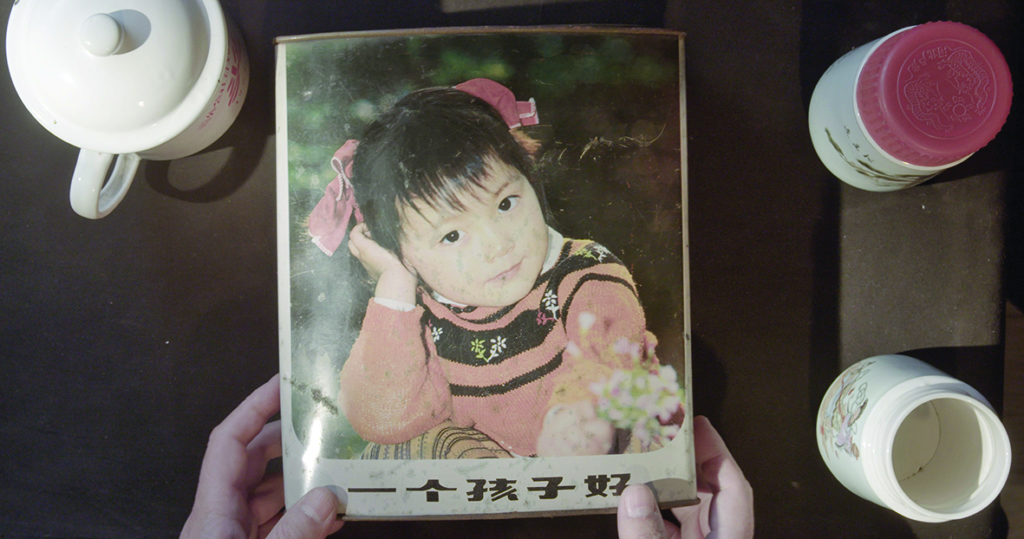
Wang and Zhang document these messy intricacies from both the outside and in – in the former’s case, as a Chinese immigrant to the US who has since learnt to critique her own conformity to her homeland’s system. We hear her voice from behind the camera, asking her interviewees inquisitive but sensitive questions – and, in passing moments, she self-reflexively captures her own reflection in a mirror, holding the camera. Wang makes her presence known, reaffirming a pattern in her filmography whereby her politically charged yet personal essayistic approach becomes, in the words of critic Phoebe Chen, ‘structurally essential’ to the resulting film’s momentum.[8]Phoebe Chen, ‘Hooligan Sparrow’, 4:3, 16 September 2016, <https://fourthreefilm.com/2016/09/hooligan-sparrow/>, accessed 24 October 2019. This is particularly evident in Wang’s debut feature documentary, Hooligan Sparrow (2016) – a spiky, guerrilla-style spotlight on women’s-rights activist Ye Haiyan. In this earlier work, Wang begins by wielding her camera as a political instrument to capture the injustice surrounding a scandal involving Chinese schoolgirls sexually assaulted by a local school’s principal. The film transforms, however, into a rebellious tool to chronicle the resulting clash and fallout between the government (under the guise of the secret police) and activists. The unpredictability of Wang’s journey puts her own life, as well as those of her family and friends, in danger, but she still presses the ‘record’ button – running through the streets behind Ye, capturing her campaign in a form not unlike a series of video diaries.
Compared to One Child Nation, Hooligan Sparrow is a rougher piece of work filled with a heightened urgency, and its frantic style boldly exposes the CPC’s frightening and strategic web of networks of power. Yet, while the stakes aren’t as explicitly high in Wang’s new film, the dangers of government interference and surveillance are still implicitly felt due to her reputation in China as a feminist and human-rights activist. During a post-screening Q&A at the 2019 Sydney Film Festival, Zhang explained that her involvement in the documentary derived from Wang’s concern that working unassisted in China would ‘jeopardise the making of the film’. Thus, the duo had to take extra precautions to ensure Wang’s safety during the filming process. Zhang told the audience of how she would work with her co-director remotely in the US, tracking Wang’s real-time location on GPS, and making specific plans ‘down to the hour’.[9]Jialing Zhang, in One Child Nation post-screening Q&A, Sydney Film Festival, 7 June 2019. Such scrupulous details reveal the extensive behind-the-scenes groundwork necessary for a film with such an attentive, critical outlook to come through on screen against the backdrop of China’s autocratic government, which actively seeks to suppress any criticism of the policy.[10]See, for example, Didi Kirsten Tatlow, ‘China Censors Critic’s Discussion of Family Planning Policies’, The New York Times, 7 September 2016, <https://www.nytimes.com/2016/09/08/world/asia/china-fuxian-yi-population-one-child-policy.html>, accessed 24 October 2019.
Yet, with One Child Nation tackling the wide scope of the one-child policy from multiple angles, Wang’s personal lens on the subject becomes both its major strength and its main blemish. It enables the film to delve into individual lives with empathy, but, in the process, also obscures other complexities that feel structurally integral to the overall picture of the scheme. While the film has been criticised for its ‘shotgun-blast generality’,[11]Peter Debruge, ‘Film Review: One Child Nation’, Variety, 7 March 2019, <https://variety.com/2019/film/reviews/one-child-nation-review-1203157147/>, accessed 24 October 2019. a more salient concern is, rather, that the documentary’s narrow focus on whether the policy was, in Wang’s words, ‘worth the sacrifices that each family made’ means it pulls its punches in addressing logistical questions, such as whether the harsh mechanics of the policy played a significant role in the country’s economic explosion from the 1980s through to the 2000s.[12]See ‘China GDP: How It Has Changed Since 1980’, The Guardian, 23 March 2012, <https://www.theguardian.com/news/datablog/2012/mar/23/china-gdp-since-1980>, accessed 24 October 2019.
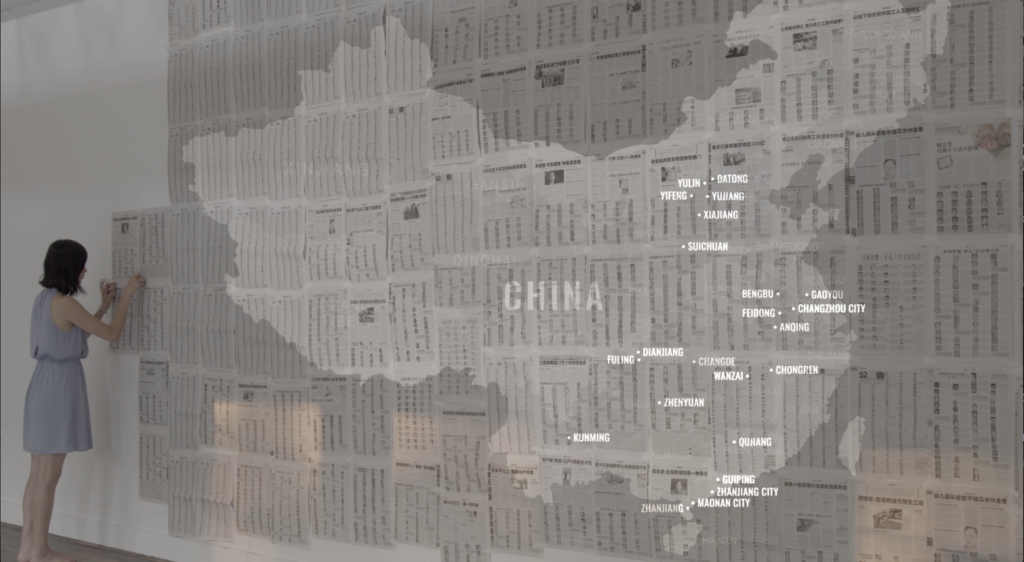
The film is seemingly less interested in becoming an authority on the topic itself, trading statistical analyses for astute, blistering testimonies of the suffering of the ordinary people who bore the brunt of the policy’s effects. After the film gets through the explanation of what happened and more fully embraces ‘why it happened’, as Wang suggests, it finds its real footing, illuminating the way in which many Chinese people felt as if they were left with no choice.[13]Nanfu Wang, quoted in Devika Girish, ‘Interview: Nanfu Wang and Jialing Zhang’, Film Comment, 12 August 2019, <https://www.filmcomment.com/blog/interview-nanfu-wang-and-jialing-zhang/>, accessed 24 October 2019, emphasis in original. This is also where the documentary’s emotional crux lies; in one montage, the camera holds still on its subjects’ faces, betraying reflectiveness and sorrow, while they speak repeatedly of the same sense of helplessness: ‘There was nothing we could do’, ‘What choice did I have?’
As the film’s final scene plays recent Chinese propaganda footage encouraging families to bear two children, it’s a confronting reminder that social narratives can be easily erased and reconstructed if there is little political and social accountability. One Child Nation becomes that very document for challenging the status quo; every discovery within Wang’s firsthand recordings becomes our own. She tells The New Yorker, ‘Every time I make a film, the film also makes me,’[14]Nanfu Wang, quoted in Han Zhang, ‘In One Child Nation, Nanfu Wang Confronts China’s History, and Her Own’, The New Yorker, 27 August 2019, <https://www.newyorker.com/culture/persons-of-interest/in-one-child-nation-nanfu-wang-confronts-chinas-history-and-her-own>, accessed 24 October 2019. her words echoing the inextricable ties between the documentary, her role as a filmmaker and her own personal life. This interweaving lends One Child Nation an intimate, unshakable clarity – becoming a mouthpiece not only for its subjects’ traumas, but also for the importance of the very means by which their stories can be preserved.
Endnotes
| 1 | This is a widely cited figure in China, but it is contested; see Martin King Whyte, Wang Feng & Yong Cai, ‘Challenging Myths About China’s One-child Policy’, The China Journal, no. 74, 2015, pp. 155–8. |
|---|---|
| 2 | See Tessa Berenson, ‘Here’s How China’s One-child Policy Started in the First Place’, Time, 29 October 2015, <https://time.com/4092689/china-one-child-policy-history/>, accessed 24 October 2019. |
| 3 | For more on this, see Brandon Yu, ‘One Child Nation Reveals the Human Costs of an Infamous Chinese Law’, The Atlantic, 13 August 2019, <https://www.theatlantic.com/entertainment/archive/2019/08/one-child-nation-documentary-nanfu-wang-jialing-zhang/595894/>, accessed 24 October 2019. |
| 4 | See Lisa Cameron, Zhang Dan-dan & Xin Meng, ‘China’s One-child Policy: Effects on the Sex Ratio and Crime’, Institute for Family Studies blog, 19 December 2018, <https://ifstudies.org/blog/chinas-one-child-policy-effects-on-the-sex-ratio-and-crime>, accessed 24 October 2019. |
| 5 | See ‘Adoption: China’, The Schuster Institute for Investigative Journalism, 22 February 2011, <https://www.brandeis.edu/investigate/adoption/china.html>, accessed 24 October 2019. |
| 6 | See Barbara Demick, ‘A Family in China Made Babies Their Business’, Los Angeles Times, 24 January 2010, <https://www.latimes.com/archives/la-xpm-2010-jan-24-la-fg-china-adopt24-2010jan24-story.html>, accessed 24 October 2019. |
| 7 | See the Research-China website, <https://www.research-china.org>, accessed 24 October 2019. |
| 8 | Phoebe Chen, ‘Hooligan Sparrow’, 4:3, 16 September 2016, <https://fourthreefilm.com/2016/09/hooligan-sparrow/>, accessed 24 October 2019. |
| 9 | Jialing Zhang, in One Child Nation post-screening Q&A, Sydney Film Festival, 7 June 2019. |
| 10 | See, for example, Didi Kirsten Tatlow, ‘China Censors Critic’s Discussion of Family Planning Policies’, The New York Times, 7 September 2016, <https://www.nytimes.com/2016/09/08/world/asia/china-fuxian-yi-population-one-child-policy.html>, accessed 24 October 2019. |
| 11 | Peter Debruge, ‘Film Review: One Child Nation’, Variety, 7 March 2019, <https://variety.com/2019/film/reviews/one-child-nation-review-1203157147/>, accessed 24 October 2019. |
| 12 | See ‘China GDP: How It Has Changed Since 1980’, The Guardian, 23 March 2012, <https://www.theguardian.com/news/datablog/2012/mar/23/china-gdp-since-1980>, accessed 24 October 2019. |
| 13 | Nanfu Wang, quoted in Devika Girish, ‘Interview: Nanfu Wang and Jialing Zhang’, Film Comment, 12 August 2019, <https://www.filmcomment.com/blog/interview-nanfu-wang-and-jialing-zhang/>, accessed 24 October 2019, emphasis in original. |
| 14 | Nanfu Wang, quoted in Han Zhang, ‘In One Child Nation, Nanfu Wang Confronts China’s History, and Her Own’, The New Yorker, 27 August 2019, <https://www.newyorker.com/culture/persons-of-interest/in-one-child-nation-nanfu-wang-confronts-chinas-history-and-her-own>, accessed 24 October 2019. |
